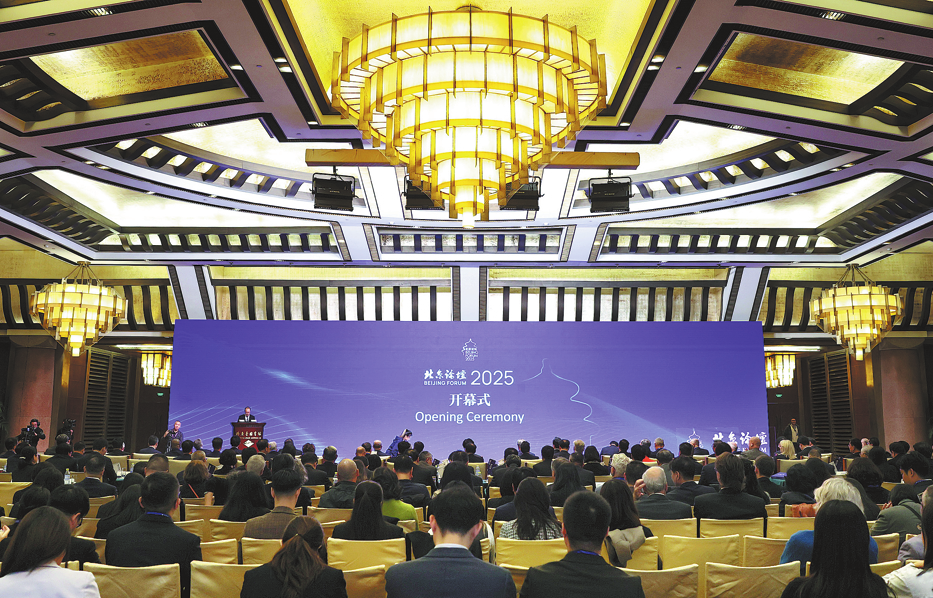Rules sought for AI-human coexistence
Experts urge collective action to face challenges, opportunities of digital age


Experts at the 2025 Beijing Forum have called for enhanced collaboration to achieve civilizational harmony and shared prosperity, emphasizing the urgent need to establish frameworks for the coexistence of humanity and artificial intelligence in the digital age.
Speakers at the forum also underscored the necessity of collective action across sectors and borders to navigate the challenges and opportunities presented by digital transformation.
Michael Levitt, Nobel Laureate in Chemistry and professor at Stanford University, said AI has the answers and people need to ask the questions. "Stay curious like an eight-year-old, wise like an 80-year-old."
Meanwhile, he said, people need to learn to take risks. Good scientists are wrong 90 percent of the time and great scientists are wrong 99 percent of the time, he added.
In science, nothing is accepted as true until evidence proves it, which also applies to AI and the internet, he said. Therefore, it is crucial to maintain a healthy skepticism and verify information before accepting it as fact.
Chey Tae-won, chairman of SK Group, highlighted the necessity of establishing laws and regulations for the coexistence of AI and humanity. He stressed that people must learn to engage with AI as another partner.
"In this era, no one should be left behind. A win-win strategy is essential," he said, underscoring that individuals, nations and AI require constant dialogue and mutual understanding to build trust.
He outlined a broader role for business beyond profit generation, stating that companies must act as designers of a sustainable future. This involves nurturing AI talent for innovation, establishing AI-responsive social safety nets and developing collaborative platforms where technology and people drive social change, he added.
He said that solving multilayered social problems requires collective action involving businesses, academia, civil society and citizens.
Yu Yingjie, secretary of the Education Working Committee of the CPC Beijing Municipal Committee, revealed that Beijing's digital economy now constitutes 45 percent of its GDP and highlighted its concentration of AI talent and enterprises.
He outlined the city's future roadmap, which includes building a global digital economy benchmark city, implementing the "AI Plus" initiative, and leveraging digital technology to enhance cultural soft power and international educational cooperation.
Beijing will build a global digital economy benchmark city, and a globally influential AI innovation source and application hub, he said.
Yu also called for strengthening the digital-era cultural center, enhancing cultural originality and using digital intelligence technology to improve international cultural communication capabilities.
Xu Qingsen, vice-minister of education, said that exchanges and mutual learning among civilizations are a vital impetus for human progress and world peace. "Different civilizations and cultures can only achieve common development and prosperity by maintaining their own characteristics while embracing each other with an open and inclusive attitude," he stated.
While AI and big data facilitate communication, he said that the technologies also bring challenges like data ethics. He identified respecting cultural diversity and advocating for equality and mutual learning as the fundamental path to bridging the digital divide and dissolving civilizational barriers.
Since it was first held in 2004, the Beijing Forum has been hosted annually by Peking University, the Beijing Municipal Education Commission and the Chey Institute for Advanced Studies.
zoushuo@chinadaily.com.cn
- Senior Xi'an official facing probe by China's anti-corruption watchdogs
- Philippines risks creating trouble for itself: China's defense ministry
- Newborn with congenital heart disease receives life-saving surgery in Yunnan
- Hong Kong charity signs diplomatic talent deal with Beijing university
- Aircraft carrier Fujian, commissioned
- Erdos offers 10,000 yuan subsidy for families having third child



































